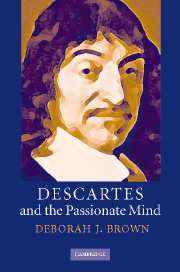Book contents
- Frontmatter
- Contents
- Acknowledgements
- Note on references
- Introduction
- 1 Volo ergo sum: the unity and significance of Les Passions de l'âme
- 2 Perturbations or sweet pleasures? Descartes' place in two traditions regarding the passions
- 3 The natural integration of reason and passion
- 4 Representing and referring
- 5 Action and passion: metaphysical integrationism
- 6 Wonder and love: extending the boundaries of the Cartesian knower and the Cartesian self
- 7 Several strange passages on desire and fortune
- 8 Generosity breeds content: self-mastery through self-esteem
- Bibliography
- Index
3 - The natural integration of reason and passion
Published online by Cambridge University Press: 15 December 2009
- Frontmatter
- Contents
- Acknowledgements
- Note on references
- Introduction
- 1 Volo ergo sum: the unity and significance of Les Passions de l'âme
- 2 Perturbations or sweet pleasures? Descartes' place in two traditions regarding the passions
- 3 The natural integration of reason and passion
- 4 Representing and referring
- 5 Action and passion: metaphysical integrationism
- 6 Wonder and love: extending the boundaries of the Cartesian knower and the Cartesian self
- 7 Several strange passages on desire and fortune
- 8 Generosity breeds content: self-mastery through self-esteem
- Bibliography
- Index
Summary
As is evident from the forgoing discussion, the standard account of sensation in antiquity and throughout much of the Middle Ages located sensations and thoughts in different parts of the soul and supposed them to have very different relations to the body. For much of the Greek tradition, including Aristotle and the Stoics, there was something divine about thought. Thought was first and foremost about the natures of things. For Aristotle and his successors, it involved reception of the forms of things without matter in the intellect, which, Aristotle suggested and his followers argued, had to be immaterial, and about which the tradition debated its immortality and its relation to God Himself. Sensation, on the other hand, was something we shared with animals and was impossible apart from a body, because it consisted in a modification of the body. Its ‘seat’ was the sensitive soul, but that should not be understood to suggest anything spiritual or mental – the sensitive soul was nothing distinct from the living organised body. Maintaining a neat separation between thought and sensation proved difficult, and in the struggle to preserve the pre-eminence of reason over the sensitive soul, the passions became an increasingly important focus of historical attention.
In many respects, the separation of thought and sensation in the Aristotelian tradition was superficial. Aristotle in De anima modelled thought upon perception and perception in many ways upon sensation, with the result that there were already in the tradition a host of difficult issues about how thought and sensation could be so distinct.
- Type
- Chapter
- Information
- Descartes and the Passionate Mind , pp. 55 - 83Publisher: Cambridge University PressPrint publication year: 2006



